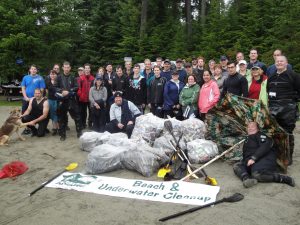 As Biology students Alycia Bradley and Sneha Thomas discovered, while everything may seem calm and pristine on the surface, it’s what lies beneath that’s important.
As Biology students Alycia Bradley and Sneha Thomas discovered, while everything may seem calm and pristine on the surface, it’s what lies beneath that’s important.
The duo took part in an underwater clean up at Sasamat Lake last month for the Splash for Trash Weekend. Thomas and Bradley were just two of the 33,000 scuba divers from 92 countries worldwide that took part in this massive clean up. The divers pulled a mass of garbage equivalent to 44 orca whales in weight.
“People don’t realize the importance of cleaning under water because we don’t see it,” Thomas explained.
The clean up at Sasamat Lake has been an ongoing project that Langley Diving has taken on. “It took them two years to clean out one little bay where we were,” Bradley explained.
“This is just the tip of the iceberg – literally,” Thomas emphasized.
The crew of about 40 divers spent Sunday morning combing the water near White Pine Beach for trash. Visibility was poor, with divers having to feel for garbage. They found a beach umbrella, underwear, two right shoes, goggles, beer cans, coffee cups, multitudes of sunglasses, plenty of fishing lines, plastic bags, and much more. At the end of the day, dozens of garbage bags were filled with trash found at the bottom of Sasamat. One team managed to fill 15 bags in just an hour.
The most disheartening things to find were items that the divers knew were intentionally dumped. “We found two-six bottles filled up and sealed so they would sink,” Thomas sighed.
Despite the fact that alcohol is prohibited in GVRD parks, the majority of what was found were alcohol containers. Thomas explained the harm this causes to local aquatic life, like catfish, which begin to live in the trash dumped in the water. “There are some creatures that can adapt, but most animals can’t.”
Trash in marine environments is a major problem worldwide. Sadly, turtles have been known to die from eating plastic which they mistake for their food, jellyfish.In some parts of the world, sharks have been being poisoned by eating shoes. “People don’t realize that even paper has ink,” Bradley explained.
More groups are beginning to realize the harm that dumping brings to aquatic life and are organizing clean ups. However, education is key to keeping lakes, rivers and oceans clean. Most people don’t realize that dropping even small garbage on land can lead to pollution in water. “TD Canada Trust does a shore clean up… one of the biggest things they find is cigarette butts,” Bradley explained. “Cigarettes are full of chemicals, which leach into the ground.”
The pair decided to take part in the Splash for Trash weekend after Thomas heard about it at her local dive shop. When Thomas mentioned the weekend to Bradley, who she knew through their joint involvement in the Pre-Med Students’ Association, she jumped at the chance. “It’s definitely a way to give back. I wish they did it more,” Bradley explained.
Both women are experienced divers. “We’re hoping to start a scuba club up in the winter [semester]. We have some amazing dives in our area. Hopefully we can work with Langley Diving to get some discounts,” Bradley laughed.
The dive has definitely left its mark on the two women. As Bradley explained, “It was a definite eye opener. If I ever see someone dump something into the water…”
Let’s just say Bradley won’t be letting them walk away without their trash.


